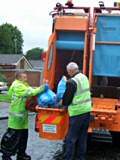Britain's bins contain millions of pounds of untapped riches, say council bosses
Date published: 05 June 2013

Refuse collection
The nation's rubbish is a gold mine which could earn local authorities and their residents an extra £1 billion by 2020 to help reduce the burden on local taxpayers.
This could be achieved through reforming the market to improve the quality of the recyclable material produced by the sector and by local authorities obtaining a better share of revenue from the 26 million tonnes of tin cans, old fridges and even disposable nappies we throw away each year.
Going beyond the current EU targets and increasing the amount of household recycling to 70 per cent could offer even greater rewards, helping to create an estimated 51,000 jobs and generate an extra £3 billion in additional revenue for the UK economy.
But council bosses are warning that unless government provides the necessary tools and investment to help them grow the booming waste sector, the country will miss out on the opportunity to unlock the true value of our waste.
The Local Government Association's local waste review, ‘Wealth from Waste', which has been published today, outlines a number of key recommendations for government on how to promote a thriving, growing, domestic market for recyclable materials as well as looking at how we increase recycling and reuse to feed growth of the sector.
Recommendations include the Treasury refunding landfill tax receipts through councils and the Green Investment Bank to fund the building of new recycling centres, a call for new industry guidelines to improve the quality of recycled material produced and sold by the UK waste sector and the introduction of reward schemes to thank residents for playing their part.
Councils and residents have played a central role in increasing the amount we now recycle to 43 per cent of household waste compared to 13 per cent a decade ago, putting the country well on track to meet its EU imposed target of 50 per cent by 2020.
Since 2008 however, successive Governments have primarily used punitive measures such as the landfill tax to encourage greater recycling levels. In the last five years, The Treasury has increased rates of landfill tax per tonne from £24 to a staggering £80, raking in around £3 billion from local taxpayers. None of this money has been reinvested to help reduce the amount of household waste being sent to landfill and the consequential burden to the taxpayer.
This means that despite having played a vital role by sorting through their recycling and helping councils with their kerbside collections, efforts which have seen the amount of residential waste being sent to landfill fall by more than half since 2000, residents are having to pay more than ever before to have their bins collected.
Do you have a story for us?
Let us know by emailing news@rochdaleonline.co.uk
All contact will be treated in confidence.
Most Viewed News Stories
- 1Rochdale Sixth Form College hits new high with twelve Oxbridge offers for students
- 2Rejection of plan for SEN school being appealed
- 3Appeal after man arrested on suspicion of multiple harassment incidents in Rochdale
- 4Record number of norovirus patients in hospital
- 5Community event to turn Wardle and Littleborough into 'magical outdoor gallery'
To contact the Rochdale Online news desk, email news@rochdaleonline.co.uk or visit our news submission page.
To get the latest news on your desktop or mobile, follow Rochdale Online on Twitter and Facebook.

